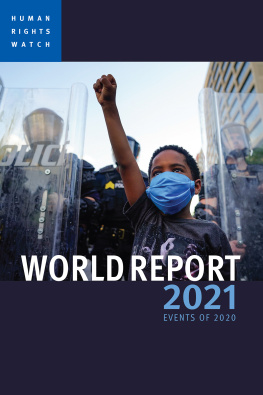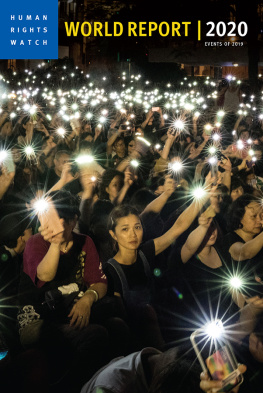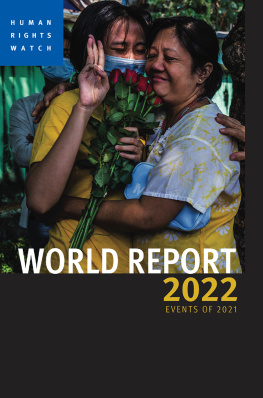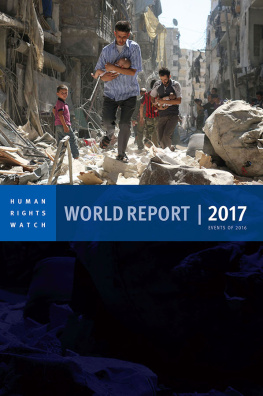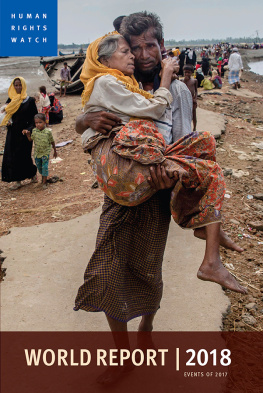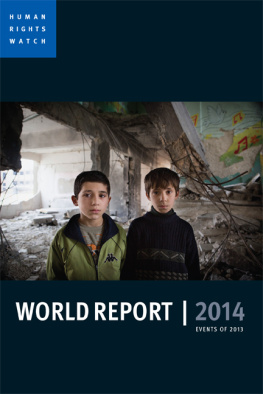Human Rights Watch - World Report 2021
Here you can read online Human Rights Watch - World Report 2021 full text of the book (entire story) in english for free. Download pdf and epub, get meaning, cover and reviews about this ebook. year: 2021, publisher: Seven Stories Press, genre: Politics. Description of the work, (preface) as well as reviews are available. Best literature library LitArk.com created for fans of good reading and offers a wide selection of genres:
Romance novel
Science fiction
Adventure
Detective
Science
History
Home and family
Prose
Art
Politics
Computer
Non-fiction
Religion
Business
Children
Humor
Choose a favorite category and find really read worthwhile books. Enjoy immersion in the world of imagination, feel the emotions of the characters or learn something new for yourself, make an fascinating discovery.
- Book:World Report 2021
- Author:
- Publisher:Seven Stories Press
- Genre:
- Year:2021
- Rating:3 / 5
- Favourites:Add to favourites
- Your mark:
- 60
- 1
- 2
- 3
- 4
- 5
World Report 2021: summary, description and annotation
We offer to read an annotation, description, summary or preface (depends on what the author of the book "World Report 2021" wrote himself). If you haven't found the necessary information about the book — write in the comments, we will try to find it.
World Report 2021 — read online for free the complete book (whole text) full work
Below is the text of the book, divided by pages. System saving the place of the last page read, allows you to conveniently read the book "World Report 2021" online for free, without having to search again every time where you left off. Put a bookmark, and you can go to the page where you finished reading at any time.
Font size:
Interval:
Bookmark:



Copyright 2021 Human Rights Watch
All rights reserved.
Printed in the United States of America
ISBN is 978-1-64421-028-4
Cover photo: Kai Ayden, age 7, marches in a protest against police brutality in Atlanta, Georgia on May 31, 2020 following the death of George Floyd in police custody.
2020 Elijah Nouvelage/Getty Images
Cover and book design by Rafael Jimnez
www.hrw.org
We scrupulously investigate abuses, expose facts widely, and pressure those with power to respect rights and secure justice.
Human Rights Watch is an independent, international organization that works as part of a vibrant movement to uphold human dignity and advance the cause of human rights for all.
Human Rights Watch began in 1978 with the founding of its Europe and Central Asia division (then known as Helsinki Watch). Today it also includes divisions covering Africa, the Americas, Asia, Europe and Central Asia, the Middle East and North Africa, and the United States. There are thematic divisions or programs on arms; business and human rights; childrens rights; crisis and conflict; disability rights; the environment and human rights; international justice; lesbian, gay, bisexual, and transgender rights; refugee rights; and womens rights.
The organization maintains offices in Amman, Amsterdam, Beirut, Berlin, Bishkek, Brussels, Chicago, Geneva, Goma, Hong Kong, Johannesburg, Kiev, Kinshasa, London, Los Angeles, Miami, Moscow, Nairobi, New York, Paris, San Francisco, So Paulo, Seoul, Silicon Valley, Stockholm, Sydney, Tokyo, Toronto, Tunis, Washington DC, and Zurich, and field presences in more than 50 other locations globally.
Human Rights Watch is an independent, nongovernmental organization, supported by contributions from private individuals and foundations worldwide. It accepts no government funds, directly or indirectly.
Redeeming a US Role for Human Rights
After four years of a president who was indifferent and often hostile to human rights, the November 2020 election of Joe Biden to the presidency of the United States provides an opportunity for a fundamental change of course.
Donald Trump was a disaster for human rights. At home, he flouted legal obligations that allow people fearing for their lives to seek refuge, ripped migrant children from their parents, empowered white supremacists, and fomented hatred against racial and religious minorities. He also closed his eyes to systemic racism in policing, removed legal protections for lesbian, gay, bisexual and transgender (LGBT) people, revoked environmental protections for clean air and water, and sought to undermine the right to health, especially for sexual and reproductive health and older people. Abroad, he cozied up to one friendly autocrat after another at the expense of their abused populations, promoted the sale of weapons to governments implicated in war crimes, and attacked or withdrew from key international initiatives to defend human rights, promote international justice, advance public health, and forestall climate change.
This destructive combination eroded the credibility of the US government even when it did speak out against abuses. Condemnations of Venezuela, Cuba, or Iran rang hollow when parallel praise was bestowed on Russia, Egypt, Saudi Arabia, or Israel. Support for religious freedom abroad was undermined by Islamophobic policy at home. The Trump administration did impose targeted sanctions and other punishments on the Chinese government and corporate entities for their involvement in human rights violations, but its own weak record on human rights, its evident mixed motives in criticizing Beijing, and Trumps scapegoating of China for his own pandemic failings left these interventions anything but principled, making working with allies difficult.
Yet it would be naive to treat a Biden presidency as a panacea. In recent decades, the arrival of each new White House resident has brought wild oscillations in US human rights policy. George W. Bushs global war on terror, with its systematic torture and Guantanamo detentions without charge, was an earlier nadir. Barack Obama rejected important parts of it, although he maintained and even expanded such elements as unlawful drone attacks, intrusive surveillance, and arms sales to unsavory autocrats. Policy reversals, both at home and abroad, have become regular features in Washington.
Global leaders seeking to uphold human rights understandably ask whether they can rely on the US government. Even if Biden substantially improves the US record, the deep political divisions in the United States mean there is little to prevent the election of another US president with Trumps disdain for human rights in four or eight years.
Yet that reality should be cause for resolve rather than despair. As the Trump administration largely abandoned the protection of human rights abroad, other governments stepped forward. Rather than surrender, they reinforced the ramparts. So even as powerful actors such as China, Russia, and Egypt sought to undermine the global human rights system, a series of broad coalitions came to its defense. Those coalitions included not only a range of Western countries but also a group of Latin American democracies and a growing number of Muslim-majority states.
As Biden assumes office, the US government should seek to join, not supplant, these collective efforts. US leadership can still be significant, but it should not substitute for or compromise the initiative shown by many others. The past four years have demonstrated that Washington is an important but not indispensable member of this broader team defending rights. Bidens aim in his foreign policy should be to lead not from in front or behind but together with this larger group of rights promoters.
For the benefit of people in the United States, and to be most effective in advancing human rights around the world, Biden should also set a positive example by strengthening the US governments commitment to human rights at home. As with US foreign policy, that commitment has swung wildly from administration to administration. This fluctuation has been most pronounced on reproductive freedom, the rights of LGBT people, the rights of asylum seekers and immigrants, voting rights, racial and economic inequities, the right to health, and the rights implicated by climate change. The challenge for Biden will be not simply to reverse the damage to human rights done by his predecessor, but also to make it more difficult for future presidents to retreat yet again.
One step would be to reinforce a commitment to human rights by legislation, which the narrow Democratic majorities in both Houses of Congress may make possible. Ideally, Biden could press for ratification of core human rights treaties that the US government has long neglected, but finding the necessary two-thirds support in the Senate will be difficult. Biden should certainly allow justice to pursue its course with respect to Trump to show that the president is not above the law, resisting the "look forward, not back rationale that Obama used to ignore torture under Bush. Like some of his predecessors, Biden can make short-term improvements by executive action, but as in the past, that is vulnerable to being undone by a future US president with less regard for human rights.
Font size:
Interval:
Bookmark:
Similar books «World Report 2021»
Look at similar books to World Report 2021. We have selected literature similar in name and meaning in the hope of providing readers with more options to find new, interesting, not yet read works.
Discussion, reviews of the book World Report 2021 and just readers' own opinions. Leave your comments, write what you think about the work, its meaning or the main characters. Specify what exactly you liked and what you didn't like, and why you think so.

